 Petzlover
Petzlover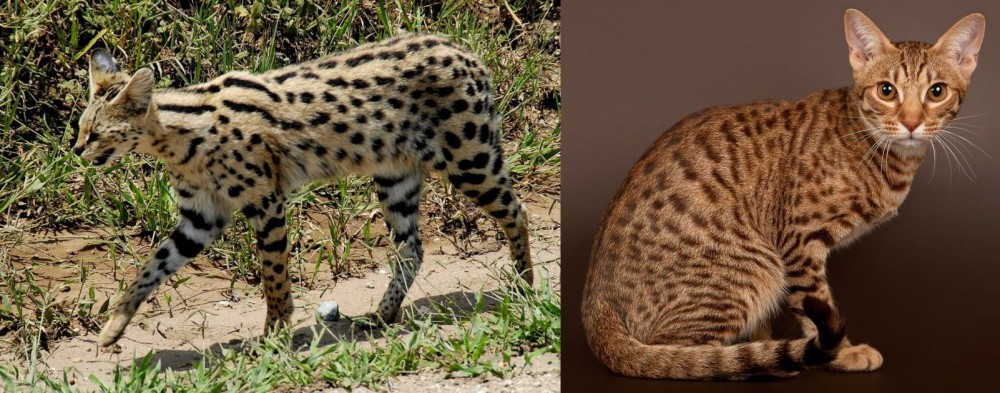 African Serval is originated from South Africa but Ocicat is originated from United States. African Serval may weigh 11 kg / 25 pounds more than Ocicat. African Serval may live 3 years more than Ocicat. Both African Serval and Ocicat has same litter size. Both African Serval and Ocicat requires Low Maintenance.
African Serval is originated from South Africa but Ocicat is originated from United States. African Serval may weigh 11 kg / 25 pounds more than Ocicat. African Serval may live 3 years more than Ocicat. Both African Serval and Ocicat has same litter size. Both African Serval and Ocicat requires Low Maintenance.
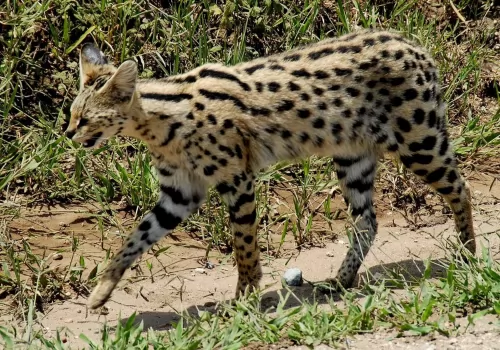 The African Serval is a wild cat that hails from Africa. You’ll see them on Africa’s savannas where there is tall grass and reeds, preferably near water.
The African Serval is a wild cat that hails from Africa. You’ll see them on Africa’s savannas where there is tall grass and reeds, preferably near water.
If you want to own a serval cat, you have to check whether you require licenses and permits as they are particularly difficult to rehome once you have owned one. Humans have kept them since ancient times, but they are not domesticated cats as such.
Breeding servals arrived in the United States many decades ago. Breeders have also crossed serval cats with domestic cats to produce hybrids, one of which is the Savannah cat.
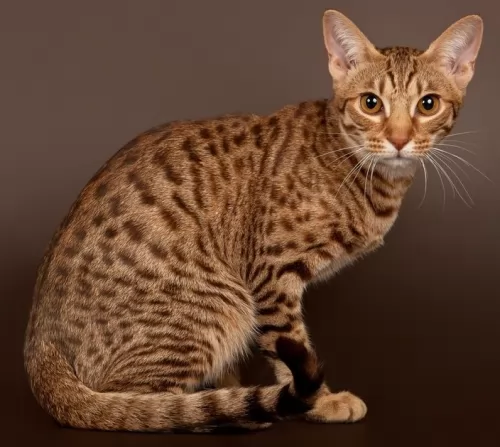 Virginia Daly was the first breeder of Ocicats, hailing from Michigan. She wanted to breed an Abyssinian-pointed Siamese in 1964 and the first kittens looked to be Abyssinian.
Virginia Daly was the first breeder of Ocicats, hailing from Michigan. She wanted to breed an Abyssinian-pointed Siamese in 1964 and the first kittens looked to be Abyssinian.
With the next litter, the Abyssinian-pointed Siamese and a spotted kitten, nicknamed an Ocicat. Further breedings produced more spotted kittens and became the basis of the Ocicat.
A breeding program was started for Siamese to Abyssinian, and the kittens bred to Siamese. Later the American Shorthair was introduced to the Ocicat and this brought in bigger boning as well as adding silver to the 6 colors of the Ocicat.
It was during the 1980s that the cat was accepted for registration in The Cat Fanciers' Association.
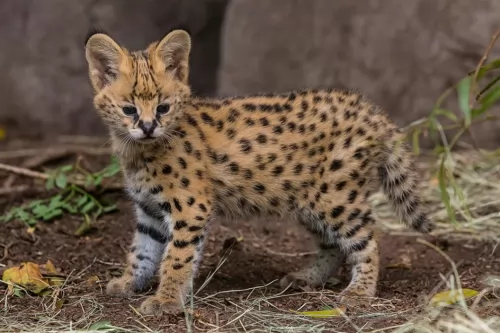 The Serval is a medium to large-sized cat that stands at between 54–62 cm in height and weighs in the region of 9–18 kg.
The Serval is a medium to large-sized cat that stands at between 54–62 cm in height and weighs in the region of 9–18 kg.
Some people think its a cat that looks similar to a Cheetah and this is because it also has a small head. It is known for its large ears which are black at the back with a large white dot. The attractively patterned coat is both spotted and striped with black against a golden/tawny shade.
These wild cats make a number of different noises - high pitched cries to growls, spitting sounds and purring. Another well-known feature with the cat is its particularly long legs. The tail has some black rings and it is black-tipped. The eyes of the Serval are a brown/greeny color.
The Serval cats will only come together for mating and then they resume their solitary lives. Gestation lasts for roughly 73 days after which up to 6 kittens can be born. In captivity, a Serval can live to be about 20 years of age.
The Serval is an active cat night and day. They are solitary animals not known for strong social interactions with humans but they can be playful with the few humans he gets to know.
People need to always know that owning a wild pet like this comes with risks. Not only that, a Serval wants to mark its territory and while you may provide a litter box, it's not to say he will use it.
They are able to bond with humans to some extent, more so if they were hand-fed from early on. They bond with one person and can form an affectionate relationship with that one person.
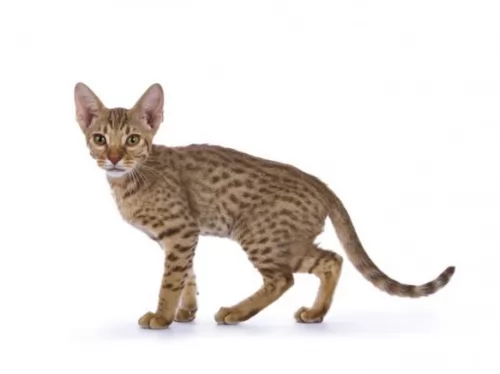 Ocicats, with their wedge-shaped heads, are strong, large cats with muscular legs that have striped markings. The cat can weight between 4 and 7kg. The ears are large and pointed.
Ocicats, with their wedge-shaped heads, are strong, large cats with muscular legs that have striped markings. The cat can weight between 4 and 7kg. The ears are large and pointed.
The cat has almond-shaped eyes. The fur has dark spots and there are many color variants that are approved by the major cat registries. The standard colors for the cat are chocolate, cinnamon and tawny.
These large cats have got personality traits from both cats – the Siamese and the Abyssinian. They are friendly, playful, and sociable cats, making excellent family pets, getting on well with children and other pets. Those who have owned them say owning such a cat is similar to owning a dog as they can be taught basic commands and tricks and even walk on a leash.
They are even known to swim with you. They’re cats that crave the attention of their human owners, but bond specifically with one person. It won’t do at all well in a household where it is left alone for long periods of time.
It's an intelligent cat and will most certainly need toys and a lifestyle that is stimulating.
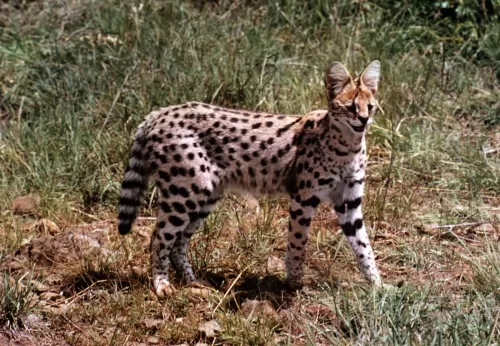 The African Serval is a wild animal and should be left in the wild.
The African Serval is a wild animal and should be left in the wild.
However, if you do decide to bring one into your home as a pet, they aren’t recommended for homes with young children or for a first-time pet owner.
Their play is rough and they like to use their teeth and claws during play. If the child gets hurt, then in typical unfair human fashion, the Serval is the one who suffers. They are capable of making good pets though but it is not recommended.
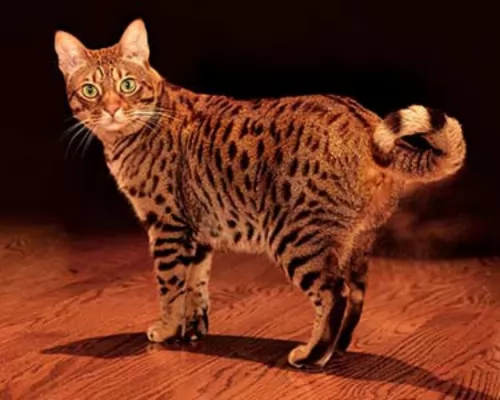 The Ocicat is a friendly, non-aggressive cat that is devoted to his human family. It’s a cat that thrives on being around people and won’t relish being left alone for long periods of time.
The Ocicat is a friendly, non-aggressive cat that is devoted to his human family. It’s a cat that thrives on being around people and won’t relish being left alone for long periods of time.
The largish cat is intelligent and easily trainable. He loves toys and it will be good to buy him some toys that require him thinking a little bit.
Highly energetic, he’ll love nothing more than for you to become involved in his games. Give him the attention he craves and he’ll become your best friend.
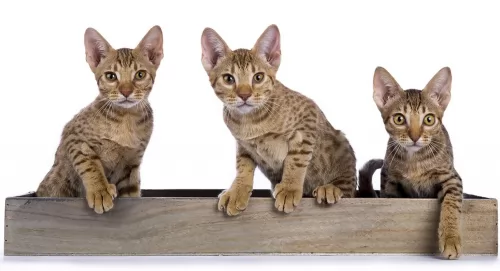 Diet is a crucial part of being a healthy cat, There are many excellent commercially manufactured cat foods on the market and your cat might prefer the wet- or dry type of cat food.
Diet is a crucial part of being a healthy cat, There are many excellent commercially manufactured cat foods on the market and your cat might prefer the wet- or dry type of cat food.
The idea is to choose the highest quality cat food that is packed with meat and protein as your cat is a carnivore. One good way to choose a good cat food is to read the ingredients and make sure that the first ingredients are meat.
He wants chicken, tuna, liver and pheasant in his diet. Make sure that the food also contains taurine as this is an essential amino acid that every cat must have.
If in any doubt, speak to your vet as cats require certain vitamins and minerals to remain healthy. Always ensure a fresh supply of cool drinking water.
Your cat requires being vaccinated and dewormed.
Get to know a good vet in your area so that if your cat is sick, you don't have to waste precious time searching for a vet.
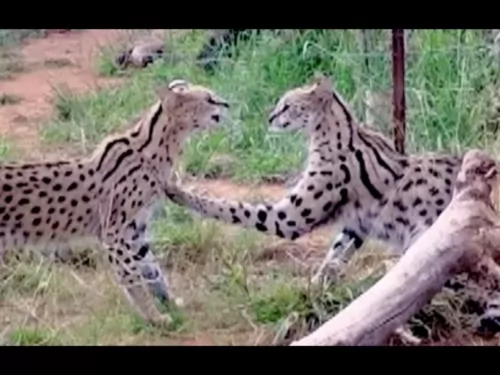 The Serval is a wild cat so in the wilds it eats prey such as frogs, birds and reptiles. They are known for leaping high into the air to catch prey but they will also burrow into holes to get prey out.
The Serval is a wild cat so in the wilds it eats prey such as frogs, birds and reptiles. They are known for leaping high into the air to catch prey but they will also burrow into holes to get prey out.
You should try to provide your Serval pet with some whole prey. Do research on the food of Servals because you will need to offer your wild pet a feline supplement. There are also formulated pelleted food, but this shouldn’t form the bulk of his food but rather be a supplement to his meats. Choose a variety of meats such as chicken, mice, turkey, beef, duck as well as rabbits and birds.
If you keep a serval, it is imperative that it has large outdoor areas to roam in. They’re nocturnal animals, so they become more active at night. They’re used to living near streams in the wild so some kind of pool will be required for him, possibly even a fish pond where he can catch his own fish.
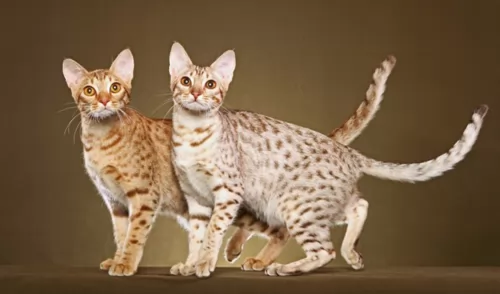 Provide your Ocicat with companionship as these are cats that can’t be left for hours on their own.
Provide your Ocicat with companionship as these are cats that can’t be left for hours on their own.
Provide your Ocicat with a litterbox that is kept clean. Your ocicat’s dropping must be regularly raked up out of the litter box sand and removed. A cat won’t use a dirty litterbox.
Treat your Ocicat for parasites. In fact, treating parasites isn’t a once-off treatment but ongoing. You can consult with your veterinarian for advice on the best and safest way to treat your pet for worms, ticks, fleas, and mites.
Brush your Ocicat’s fur once a week. They have short fur so they are fairly low maintenance. You can use a rubber hand brush and you can even wipe the fur down with a damp cloth to remove dust. He will have to have his claws trimmed.
Nobody should buy a pet and then do as little as possible for it. Your Ocicat’s going to need daily exercise as well as mental stimulation and he will require this through interaction with his human family. Buy him stimulating toys to keep him busy, play games with him and buy a cat leash so you can take him on walks outdoors for a bit of sunlight.